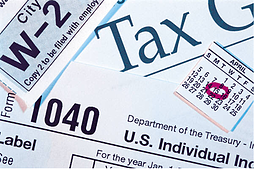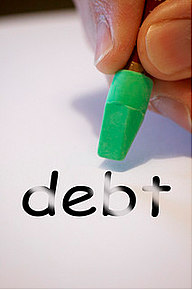 Just the word BANKRUPTCY sounds terrible! Before you decide if bankruptcy is best for you, here are 3 ways to avoid bankruptcy:
Just the word BANKRUPTCY sounds terrible! Before you decide if bankruptcy is best for you, here are 3 ways to avoid bankruptcy:
One of the most popular financial-advice gurus today is Dave Ramsey. He has stated that BANKRUPTCY is one of the top five life-altering negative events a person can experience:
- Divorce
- Severe illness
- Disability
- Death of a loved one
- Bankruptcy
I'm not sure I totally agree, but most people will do whatever it takes to avoid bankruptcy. Bankruptcy basically means that you have taken on too much debt and cannot repay.
I have counseled hundreds of people in financial trouble for many years and it has been my experience that most people who are in serious financial debt got that way from circumstances beyond their control, such as:
- Loss of employment
- Illness or disability
- Death of a spouse or life partner
- Too little income after retirement
Here are 3 Ways To Avoid Bankruptcy
#1 Figure out where your money is going
The first thing you should do to avoid bankruptcy is to take time to complete a Budget or Financial Worksheet. It sounds so simple, but most people I counsel have no idea what they are spending each month. All they know, is there is not enough money to pay for everything.
You have to know exactly where you stand, financially. How much money is coming in and how much is going out each month.
I know it's very, very tight, but ask yourself if there are areas of your life or expenses that you could reduce or eliminate, such as:
- Do you have a large car payment? Maybe you could downsize or refinance to reduce your monthly payment.
- How about all those lunches, coffee, lattes? Can you cut down to a couple times a week instead of every day? Think of it as a special treat, not a necessity.
- Maybe now is a good time to quit smoking! I know it's easier said than done, but at well over $100-$150 month it would be good for your budget and your health.
- Do you have to have that health club membership? Could you work out at home instead to save $35-40$?
Have I made my point? You may be able to find a few hundred dollars each month that could possibly save you from bankruptcy!
#2 Consider enrolling in a Debt Management Program
If cutting your budget won't work, or you have already cut it as far as you can, then perhaps DEBT MANAGMENT (formerly called Credit Counseling or Debt Consolidation) may help. Debt Management is a program whereby you can arrange repayment of your unsecured debts like:
- Credit Cards
- Store Cards
- Personal Loans
- Private Student Loans
- Medical Bills
You will have ONE MONTHLY PAYMENT which is divided and sent to each of your creditors per the agreement arranged with them by a DEBT MANAGEMENT COMPANY. The program is usually designed to repay 100% of your debt over 3-5 years.
The problem is that you may not be able to afford the monthly payment which is usually about 2.5%-2.7% of your total unsecured debt. Do a quick calculation to see if that fits into the budget you created in step 1.
Sometimes, the debt management payment may be higher that the very low (almost impossible ever to repay in your lifetime) minimum monthly payments that credit cards require! If you cannot qualify for Debt Management, then your next option is:
#3 Settle Your Debts for Less with a Debt Settlement Program
In a DEBT SETTLEMENT PROGRAM, negotiations are made with each of your creditors to accept much less (often 50% or less) of the balance. You will be making a monthly contribution to a FDIC Reserve Bank Account where your funds accumulate for settlement offers.
Depending on several factors, you may able to not only GET OUT OF DEBT in 24-48 months or less, and you will avoid BANKRUPTCY.
Although you can negotiate with creditors on your own, it is not easy! We have been helping clients negotiate and settle debts for over 10 years. Is DEBT SETTLEMENT FOR YOU? Find out today!
If cutting expenses, debt management or debt settlement will not help, then you should consult a qualified bankruptcy attorney. Bankruptcy is a way for you to get a fresh start and is not nearly as tramatic as you may think!



 If you have received a 1099-C, DON'T PAY THE ADDITIONAL TAX until you know your rights!
If you have received a 1099-C, DON'T PAY THE ADDITIONAL TAX until you know your rights!
 Your getting calls from a debt collector, but you do not believe you owe the debt.
Your getting calls from a debt collector, but you do not believe you owe the debt.  Getting several calls from harassing debt collectors?
Getting several calls from harassing debt collectors? If you have received wage garnishment due to a judgment issued on your unpaid credit cards or other personal loans, it may be possible to stop it.
If you have received wage garnishment due to a judgment issued on your unpaid credit cards or other personal loans, it may be possible to stop it. There are many false assumptions when it comes to credit scores. Here are five credit score myths that you should understand:
There are many false assumptions when it comes to credit scores. Here are five credit score myths that you should understand: Here are 5 tips on how to eliminate credit card debt that you can use:
Here are 5 tips on how to eliminate credit card debt that you can use: When your debts are out of control and you miss or get behind in payments, the creditor will do whatever they can to collect, including calling and calling and calling....
When your debts are out of control and you miss or get behind in payments, the creditor will do whatever they can to collect, including calling and calling and calling.... If you are looking for a debt settlement company in Oregon or anywhere else in the country for that matter, there are 5 things to look for:
If you are looking for a debt settlement company in Oregon or anywhere else in the country for that matter, there are 5 things to look for: Debt collector harassment can be stopped!
Debt collector harassment can be stopped!

